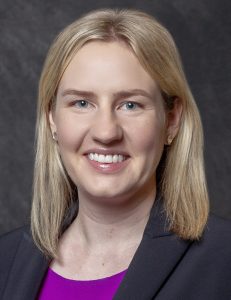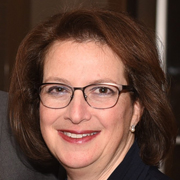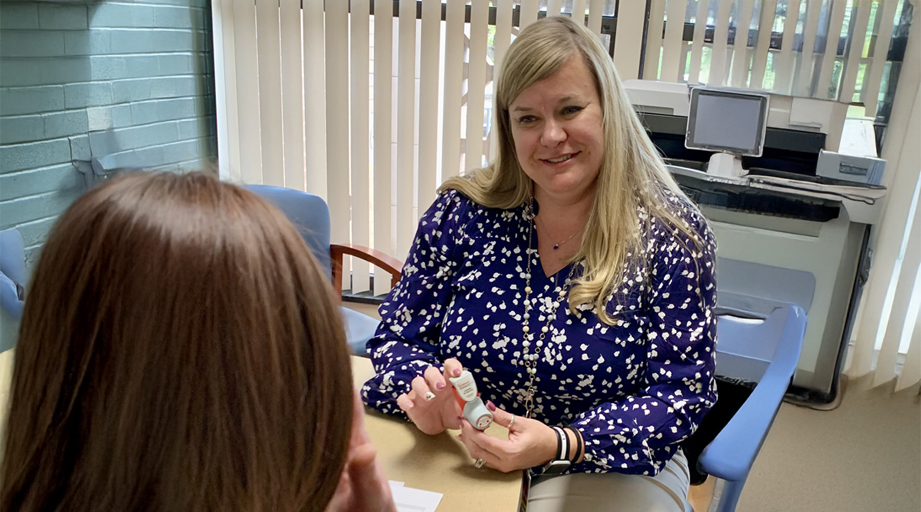
PHARMACISTS WITH FROEDTERT HEALTH in Milwaukee had recently decided to move forward on an enterprise-wide pharmacogenomics strategy when several colleagues sent Jordan Spillane, PharmD, director of ambulatory pharmacy services, an email about a new pharmacogenomics accelerator being launched by ASHP and the University of Minnesota College of Pharmacy.

"It sounded intriguing, and we were able to get a meeting scheduled [with ASHP] quickly to learn more about it," Dr. Spillane said. She then pitched the idea of participating to the pharmacy's executive and ancillary services and received approval.
Pharmacogenomics Accelerator Program
The 12-month Pharmacogenomics Accelerator program developed by the University of Minnesota and ASHP aims to accelerate the implementation and growth of pharmacy-led pharmacogenomics services in hospitals and health systems. The program strives to improve the health of millions of patients across the U.S. by personalizing medication therapies based on individuals' pharmacogenomic profiles, which can indicate how a person's genetic attributes might affect their response to certain medications.
The Accelerator supports clinicians in implementing and growing pharmacogenomics services at their institutions and offers a range of learning experiences in a collaborative approach, from webinars and events with subject matter experts to individualized support from implementation coaches.
Froedtert Health was one of three institutions to join the program's first cohort, which started last September, along with Texas A&M Irma Lerma Rangel School of Pharmacy in College Station, and Wentworth-Douglass Hospital in Dover, N.H.
"It has been a really good experience," Dr. Spillane said. "What really sold me on the accelerator program was it wasn't just going to be clinical, and it wasn't just going to be operational or leadership focused. It was really combining all of those aspects."
Initially, Dr. Spillane and two pharmacists, co-funded by the Medical College of Wisconsin School of Pharmacy, were asked to do a readiness assessment individually, which helped them understand what their priorities were. "That helped our assigned coaches get to know us as individuals, but also as a team and an organization," she said.
The first two larger group meetings covered leadership aspects such as implementation science and business proposal writing, Dr. Spillane said. "But since then, it's been much more focused on the clinical applications of pharmacogenomics and how we truly operationalize that in a way that makes clinical sense."
With input from accelerator program experts, Froedtert implemented a pharmacogenomics pilot with the heart and vascular service line to test for variations in the CYP2C19 gene that could affect how people respond to antiplatelet therapies. "This pilot is going to help us understand our workflow, informatics, and laboratory needs," Dr. Spillane said. The end goal, she said, is to use the pilot findings and everything else they've learned through the accelerator program to implement a module in the electronic health record to offer pharmacogenomics testing systemwide.

A Game-Changing Experience
At Texas A&M Health, ASHP member Sara Rogers, PharmD, BCPS, had just started a new job directing the rollout of a pharmacogenomics pilot when she heard about the accelerator program. These efforts were expanding from one small pilot in a family care clinic to a larger clinical service for a 45-doctor outpatient primary care clinic in a rural, underserved area, said Dr. Rogers, a clinical assistant professor of precision medicine and ambulatory care, and PGY2 ambulatory care residency program director. Her colleagues also had developed a dedicated EHR to conduct research on better understanding gene and drug associations and were looking to scale up their service.
Participating in the accelerator program has "been a game changer because at the very least it's bringing everyone together one to two times a month," Dr. Rogers said. In addition to regular cohort meetings, each site meets individually with their implementation coach and can pull in field experts as needed to answer site-specific questions.
"It's completely changed the way we think about our approach to doing things, from metrics that we're capturing in the research all the way to considerations for the actual workflow and the clinic," she added. "You could do this for 10 years and maybe never get the level of perspective that you get in one year from the accelerator."

Expanded Pharmacogenomics Services
Seeing a patient with a poor outcome inspired ASHP member Suzanne Stevens, PharmD, BCOP, oncology pharmacy manager and PGY-1 residence program director at Wentworth-Douglass Hospital, and colleagues to start pharmacogenomics testing for a large 38-gene panel in the oncology department. They already were working closely with an ambulatory care practice where they could suggest changes to medications like statins based on test results. But they were looking to expand their services when they signed on with the accelerator program, Dr. Stevens said.
"I really appreciate the expert content that we have," she said. "It's amazing to be able to email these folks and have the answers at our fingertips. The ASHP team is really great to work with." She also appreciated that pharmacogenomics experts have made suggestions to further the program in their institution, kept them on task and even reviewed slides for presentations on the pharmacogenomics program to hospital staff and the foundation that supported their participation in the accelerator program. The pharmacogenomics team at the hospital meets every other week and is often joined by their implementation coach, who has provided guidance on the next steps.
"Pharmacists are at a great leverage point to be able to implement pharmacogenomics," Dr. Stevens said. "We are the drug experts. It's just an amazing opportunity for pharmacists to do precision medicine. You test these genes and get the information back to guide therapy for patients and hopefully decrease adverse drug events, which then decreases emergency room visits, physician visits and health care costs. I'm excited to see where it goes."
In her experience, patients get really excited once they see their results and want their family members tested as well.
The Pharmacogenomics Accelerator Program, while new, has a clear track record of success, noted Dr. Rogers. "I envision that more health systems will follow through because it really shows the commitment of participating health systems to expanding pharmacists' roles in precision medicine," she explained.
Visit ASHP's Innovation Center to learn more about the Pharmacogenomics Accelerator program, including how to join the next cohort, which starts in the fall.







